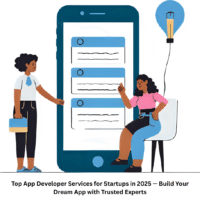Emerging Technologies in Android: Shaping the Future of Mobile Innovation
Since its launch in 2008, Android has transformed the mobile operating system landscape. As an open-source platform, it has encouraged extensive collaboration, leading to rapid advancements and a vast ecosystem of applications and devices. The future of Android promises to be even more thrilling, with emerging technologies driving innovation and altering how we interact with mobile devices. This essay explores several key areas where Android technology is advancing, including artificial intelligence, augmented reality, 5G connectivity, foldable devices, and enhanced security measures.
Artificial Intelligence and Machine Learning
Artificial intelligence (AI) and machine learning (ML) are at the forefront of technological innovation within Android. Google, the primary developer behind Android, has integrated AI and ML capabilities deeply into the operating system through frameworks like TensorFlow Lite and ML Kit. These tools enable developers to create smarter, more responsive applications that can learn from user behavior and adapt accordingly.
Voice Assistants and Natural Language Processing:
Google Assistant, a prominent feature in Android, leverages natural language processing (NLP) to understand and respond to user queries more naturally. The continual improvements in NLP are making voice assistants more accurate and intuitive, allowing for seamless interactions between users and their devices.
Personalization and Predictive Analytics:
AI-driven personalization is enhancing user experiences by predicting preferences and providing customized content. For instance, the Google Discover feed on Android devices uses AI to curate news and articles based on individual interests. Similarly, predictive analytics are being used in apps to anticipate user needs, such as suggesting replies in messaging apps or optimizing battery usage based on usage patterns.
Augmented Reality
Augmented reality (AR) is another transformative technology within the Android ecosystem. AR overlays digital information onto the real world, providing immersive experiences that blend physical and virtual environments. Google’s ARCore platform is a critical enabler of AR on Android, allowing developers to create sophisticated AR applications.
AR in Gaming and Entertainment:
Games like Pokémon GO have demonstrated the potential of AR to create engaging, location-based experiences. Future developments in AR are expected to deliver even more interactive and visually stunning games that leverage the full capabilities of modern Android devices.
Practical Applications of AR:
Beyond entertainment, AR is being applied in various practical scenarios. For example, AR navigation in Google Maps enhances pedestrian navigation by overlaying directions onto the real world. Similarly, AR-based tools for home improvement, such as apps that let users visualize furniture placement or paint colors in their homes, are becoming increasingly popular.
5G Connectivity
The advent of 5G technology is set to revolutionize the capabilities of Android devices. With significantly higher data speeds, lower latency, and the ability to connect more devices simultaneously, 5G opens up new possibilities for mobile computing.
Enhanced Mobile Experiences:
5G connectivity enhances the performance of existing applications and enables new use cases. For instance, streaming high-definition video and gaming on-the-go becomes smoother and more reliable with 5G. Additionally, real-time applications like video conferencing and augmented reality experiences benefit from reduced latency and faster data transfer rates.
Internet of Things (IoT):
5G’s capacity to handle a vast number of connected devices is crucial for the growth of the IoT ecosystem. Android’s integration with IoT devices, from smart home gadgets to wearable technology, is poised to expand significantly, allowing for seamless control and monitoring of a wide array of devices through a single Android interface.
Foldable Devices
Foldable devices represent a significant innovation in the hardware space, with Android playing a pivotal role in their development. These devices offer the flexibility of a tablet combined with the portability of a smartphone, providing users with a versatile computing experience.
Adapting User Interfaces:
Android has introduced features specifically designed to optimize the user experience on foldable devices. For example, the operating system supports seamless transitions between different screen modes, allowing applications to adapt dynamically to changes in screen size and orientation. This flexibility enables multitasking and enhances productivity by allowing users to run multiple apps side-by-side or expand a single app across a larger screen.
Innovative Use Cases:
Foldable devices open up new possibilities for app developers. Gaming, productivity, and creative applications can take advantage of the larger screen real estate to offer more immersive and interactive experiences. For instance, a photo editing app can display the full image on one side of the screen while providing editing tools on the other, enhancing the user’s workflow.
Enhanced Security and Privacy
As mobile devices become increasingly integral to our lives, security and privacy have become paramount. Android is continually evolving to address these concerns through robust security features and privacy enhancements.
Biometric Authentication:
Android supports a variety of biometric authentication methods, including fingerprint scanning, facial recognition, and iris scanning. These technologies offer a secure and convenient way to unlock devices and authenticate transactions, reducing the reliance on traditional passwords.
Privacy Controls:
Recent versions of Android have introduced more granular privacy controls, allowing users to manage permissions for individual apps more effectively. For example, users can now grant location access to apps only while they are in use, rather than all the time. Additionally, Android provides transparency regarding app data usage, helping users understand how their information is being used and shared.
Security Updates and Google Play Protect:
Regular security updates are crucial for protecting devices against emerging threats. Android’s update mechanism ensures that users receive timely patches to address vulnerabilities. Google Play Protect further enhances security by continuously scanning apps for malware and other harmful behavior, providing an additional layer of defense.
The Role of Edge Computing
Edge computing is an emerging technology that processes data closer to the source, reducing latency and bandwidth usage. Android devices are increasingly leveraging edge computing to deliver faster and more efficient services.
Real-Time Data Processing:
By performing data processing on the device rather than relying solely on cloud services, edge computing enables real-time applications such as augmented reality, gaming, and video streaming to perform better.
Conclusion
The future of Android is being shaped by a confluence of emerging technologies that promise to redefine the mobile experience. Artificial intelligence, augmented reality, 5G connectivity, foldable devices, enhanced security measures, edge computing, and the expansion into emerging markets are all contributing to Android’s evolution. As these technologies continue to develop, Android will likely remain at the forefront of innovation, providing users with increasingly powerful and versatile tools to navigate the digital world. By staying ahead of technological trends and addressing the needs of a diverse global user base, Android is poised to continue its legacy of transforming the way we interact with mobile devices.













